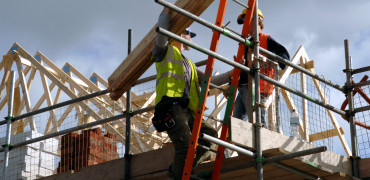The late, great Spike Milligan had a penchant for ending a comedy sketch on his Q-Series of programmes by looking straight into the camera and asking: “What are we going to do now? … What are we going to do now? …” as he slowly shuffled off screen with his ensembled cast of players.
He is probably one of the few comedians to get away with it.
However, some may argue the leaders of the Leave vote did a pretty good impression of Spike and his colleagues in the aftermath of the Brexit referendum. What’s more, they still seem to be asking: “What are we going to do now…?”
We still seem to be left with far more questions than answers as regards Brexit and the massive impact it will have.
The building and construction industry is not alone in scratching its collective head at the lack of answers. But, arguably, the stakes are particularly high for the industry compared to some others.
There is also mounting anxiety about the spiraling costs of materials
£40 billion export market?
A new report has called on the UK Government and business leaders to work to ensure the construction sector is a priority, moving forward, as Britain looks for viable avenues to lessen the economic blow of Brexit.
According to the study from British construction consultancy Mac, modernising methods to make the UK a world leader in the $8 trillion global construction industry could create a near £40 billion a year export market for the country.
The dramatic rise in city living presents Britain with a unique opportunity to utilise so called Modern Methods of Construction (MMC), which include off-site manufacturing and advanced digital design.
These have been identified by the UK Government as a way to produce well-designed, energy efficient homes at pace with a leaner and high-skilled workforce.
Can we be a jewel?
But in the Brexit-inspired limbo that many feel the industry has been allowed to slide into, the UK is likely to fail to miss the Government’s own construction and housebuilding targets and even more damagingly could miss out on lucrative opportunities.
Mark Reynolds, Chief Executive of Mace, said, “The construction sector can be a jewel in Britain’s post-Brexit exporting crown. Thanks to a legacy of pioneering achievements, the UK is respected throughout the world as experts in delivering major, complex and innovative construction projects.
“Embracing modern methods of construction and exporting our knowledge around the world could lead to billions of pounds more in trade and help build new relationships with major markets around the world.”
The next generation of professionals
Others point out the industry is also experiencing serious challenges. Specialist industry insurers ECIC highlight the fact that construction’s skilled contractor workforce has aged with 500,000 expected to retire in the next 10 years and the younger generation joining the sector are struggling to fill the gap.
The Construction Industry Training Board’s research shows one in three construction firms employs migrant workers and ONS data shows these workers are on average much younger than UK nationals working in the sector. Just 18% are aged 45 or above, compared with almost half of UK nationals (47%).
There is growing concern that this invaluable human resource is at risk of dissipating following Brexit.
ECIC warns that an increased reliance on sub-contractors increases main contractors’ responsibilities around site risk management and ensuring insurance arrangements are adequate to cover all those employed.
In practical terms this means obtaining evidence that confirms a worker has read or been made aware of the risk assessment, has fully understood the risks and has received the required training and the correct personal protective equipment prior to undertaking any work.
Cost of materials
There is also mounting anxiety about the spiralling costs of materials. Since the Brexit vote, material prices have soared in certain sectors and others are starting to see more increases. The major worry is that without a good enough deal, manufacturers will be faced with even bigger cost increases and this in turn will be passed on down the line.
Industry bodies have increased efforts to try and steer government Brexit policy as the UK prepares to cease being an EU member state in March 2019.
The EURIS advisory body, representing thousands of companies and organisations, has called on the government to avoid a ‘no deal’ Brexit arrangement at all costs.
Advisory body chair Dr Howard Porter has sent an open letter to Prime Minister Theresa May warning of significant industry concerns about a failure to reach an agreement with the EU around its future relationship and customs arrangement with the UK.
Dr Porter said in the letter, “We are still very concerned by the possibility of a ‘no deal’ scenario. This outcome would cause enormous disruption to UK industry and risk substantial economic damage to all of our companies.”
So, as we wait for more details to hopefully emerge and amid all the confusion, concerns and challenges the industry faces, one crucial question remains: “What are we going to do now?”




